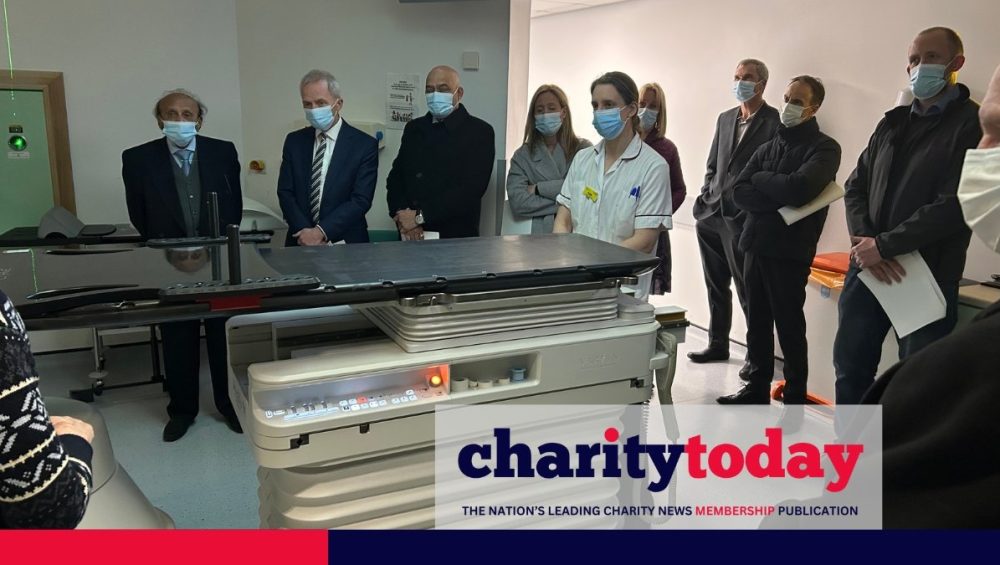A new technology which removes the need for cancer patients to have permanent tattoos to guide their radiotherapy treatment is now available in Shropshire.
Surface Guided Radiotherapy (SGRT), which delivers targeted treatment using specialist equipment, has been installed within the Radiotherapy department of the Lingen Davies Cancer Centre at The Royal Shrewsbury Hospital.
The Centre treats up to 12,000 radiotherapy patients each year who travel from across Shropshire, Telford & Wrekin, and Mid Wales for treatment.
The new technology delivers many benefits for staff and patients, primarily removing the need for tattoos which have been used for many years to guide radiotherapy treatment and ensure that healthy areas of the body are protected as far as possible.
Many patients feel distressed having these permanent tattoos as a reminder of their treatment and this is in addition to the discomfort of patients often needing to be physically moved into the correct position by radiotherapy staff.
The new technology will also reduce waiting times as services will be more efficient and allow for increased capacity.
SGRT is being installed thanks to a substantial donation of £416,666 from The Directors of Telford Plaza Ltd to Lingen Davies Cancer Fund – which supports cancer services at The Royal Shrewsbury Hospital, and in the wider community.
Naomi Atkin, CEO of Lingen Davies, said thanks to the generosity of Telford Plaza Ltd, many people having to undergo radiotherapy here in Shropshire will have a dramatically different experience as they will not be left with permanent physical tattoos and should have a smoother experience of treatment.
She said:
“SGRT is only in use in 17 of the 65 cancer treatment centres throughout the UK, so it is clear how specialist this is. It is going to transform the experiences of those getting radiotherapy treatment here and will make a real difference to those impacted by cancer in our community.
“We are delighted to become the 18th location to offer this relatively new technology as it has wide-ranging benefits for cancer patients including removing the need for permanent tattoos, which can be a tremendously negative reminder for those who have had cancer treatment, and it will enhance the patient experience overall.
“Our goal as a charity is to enhance cancer care and treatment for patients, ensuring local people can access excellent cancer services locally, reducing the need for poorly people having to travel further afield into the West Midlands for care.
“SGRT is not currently funded by the NHS because it is not a core function for effective treatment – not essential to the success of radiotherapy. However, we want to deliver it for our patients because of the wide-ranging benefits of this technology on individuals, treatment times, waiting times, staff morale, and general running costs – it helps mental health, wellbeing, and quality of life.”
SGRT will initially be installed on the CT Scanner and two of the existing three Varian Truebeam Linear Accelerators (Linacs) at the Lingen Davies Cancer Centre at the Royal Shrewsbury Hospital.
The third Linac is due to be replaced in the next three years and SGRT will then be implemented on the third new machine.
The managing director of Telford Plaza Ltd, which donated the money to enable SGRT to be brought to Shropshire, said it has always been their company policy to give back to the community where they operate.
He said:
“We see this as our duty and not necessarily something to be proud of. We have a strict policy in that we never give cash, we pay directly for tangible assets that benefit the whole community, not based on race or religion.
“We are privileged to be in a position to help and hope we will continue to help in the future.”
Lingen Davies said studies have shown tattoos have a negative psychosocial impact on breast cancer survivors with up to 70% of patients viewing these negatively – and 78% of patients would opt for tattoo-free radiotherapy if possible.
The charity said reducing the need to physically handle patients during treatment also helps maintain their dignity and reduce physical stress on radiotherapists.

